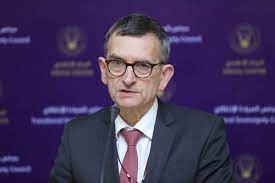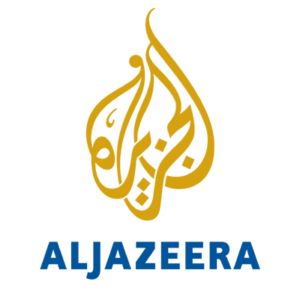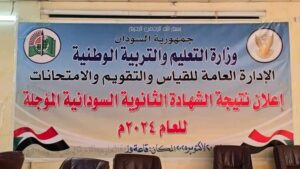السودان واحتمالات رؤية الضوء في نهاية النفق

ظل الهدف الأساسي للأمم المتحدة منذ انقلاب الخامس والعشرين من أكتوبر 2021 هو تيسير التوصل لاتفاق يقوم على ترتيبات بقيادة مدنية ترتكز على ترتيبات دستورية متفق عليها. الهدف من هذا الاتفاق هو العمل على تحقيق أهداف ثورة ديسمبر 2018 التي عبر السودانيون عنها تحت شعار: حرية سلام وعدالة. وقد ساعدت المقاومة الشعبية للانقلاب على اقناع كل الأطراف بأن الوضع الحالي غير مستدام ووضح بجلاء ضرورة إيجاد حل شامل يستعيد مسار التحول الديمقراطي تحت قيادة مدنية. وفي هذا الإطار تأسست الآلية الثلاثية لتنسيق جهود البعثة الأممية والاتحاد الإفريقي والإيقاد لتيسير التوصل لاتفاق سوداني يؤدي لتشكيل حكومة انتقالية بقيادة مدنية.
حققت الآلية الثلاثية تقدمًا تدريجيًا في هذا الصدد، فعقدت جلسة فنية عامة في 8 يونيو بمشاركة المكون العسكري والعديد من المجموعات المدنية، غير أن بعض اللاعبين الأساسيين، مثل قوى الحرية والتغيير – المجلس المركزي، والحزب الشيوعي السوداني ولجان المقاومة قررت عدم المشاركة. واتفق كل من شارك في ذلك الاجتماع على أن وجود الأطراف التي لم تحضُر هو أمر أساسي لإنجاح التوصل لحل قابل للتطبيق.
بعد يوم واحد من تلك الجلسة، وفي التاسع من يونيو اجتمعت قوى الحرية والتغيير (المجلس المركزي) والمكون العسكري علانية ووجهًا لوجه للمرة الأولى في اجتماع نظمته الولايات المتحدة الأمريكية والمملكة العربية السعودية. رحبت الأمم المتحدة وشركائها في الآلية الثلاثية بهذا التحرك الذي فتح الباب أمام التواصل المباشر بين اثنين من الفاعلين الأساسيين ممن يجب أن يشملهم حل الأزمة السياسية القائمة. ولكن حتى هَذَانِ المكونان ليسا كافيين للتوصل إلى حل.
لقد تضمن بيان الفريق أول ركن عبد الفتاح البرهان في الرابع من شهر يوليو إشارات إيجابية حول استعداد المكون العسكري لقبول حكومة بقيادة مدنية تدير التحول الديمقراطي، وهو الأمر الذي أكد عليه الفريق أول محمد حمدان دقلو لاحقًا. ومثّل ذلك الأمر تحديًا للقوى المدنية حيث شجعناها على قبول التحدي. إن انسحاب القوات المسلحة من السياسة والعودة للحكم المدني ظلّ مطلبًا أساسيًا من مطالب الشارع وغالبية الأحزاب والقوى السياسية المدنية، ولهذا فإن تلك اللحظة تمثل فرصة يجب اغتنامها للتعامل مع الأزمة الراهنة، وأيضًا وللإجابة على واحدة من أهم المعضلات التي يواجهها السودان منذ الاستقلال وهي العلاقة بين المدنيين والعسكريين.
الآن، يتفق كل السودانيين تقريبًا على ضرورة تغيير الوضع الذي أحدثه انقلاب 25 أكتوبر. هنالك حاليًا العديد من المبادرات السياسية التي تقترح حلولاً. لقد ذكّرنا أكثر من مرة أن المِلكِيَّة السودانية للعملية السياسية هي حجر الزاوية لنجاحها، ونحن في الأمم المتحدة، والآلية الثلاثية، سنواصل تقديم الدعم غير المحدود لكل الجهود السودانية التي تهدف لتجاوز الأزمة والوصول إلى حل، ولتلك الغاية سنواصل تقديم المساعدة الفنية ونوفر مساحة يمكن أن يتم تجسير الآراء المتباينة فيها عندما تدعو الحاجة لذلك، مع ذلك فإننا لن نكون أكثر توقًا إلى التوصل لتفاهم من السودانيين أنفسهم.
إنه لأمر حميد أن أصحاب المصلحة السودانيين قد بدأوا في الالتقاء والتحدث إلى بعضهم البعض بشكل أكثر شمولاً، وأنهم بدأوا في إحراز تقدم في تجسير اختلافاتهم الأساسية، على سبيل المثال ما يجري بين الأحزاب التي تم عزلها في 25 أكتوبر والقوى المدنية الأخرى. وعلى كل هذه الأحزاب الآن أن تضع على رأس أولوياتها المصلحة الأكبر المتمثلة في العودة لانتقال ديمقراطي ذي مصداقية، وينبغي عليهم أن ينتبهوا لعامل الوقت.
الوقت ليس في صالح السودان. حالة الإنسداد السياسي ستؤدي إلى خسارة المزيد من المكاسب الوطنية التي تحققت مؤخرًا. فمثلاً، أظهر تقرير نادي باريس الصادر بتاريخ 14 يونيو 2022 أن إحراز تقدم في عملية إعفاء الديون، التي تبلغ 56 مليار دولار، هو أمر مستحيل في ظل الظروف الراهنة. وقد كان إعفاء الديون أحد أبرز النجاحات التي حققتها الحكومة الانتقالية السابقة. كذلك يمنع هذا الوضع السودان من الاستفادة من المساعدات التنموية الدولية ويُعيق الاستعادة الكاملة للعلاقات مع المؤسسات المالية الدولية، كما يحُد من مقدرتي على المساعدة في حشد التمويل الدولي لدعم الاستقرار والتنمية أو تنفيذ اتفاقات السلام. كما تشير التقارير إلى أن ثلث الشعب السوداني سيواجه خطر انعدام الأمن الغذائي الحاد خلال هذا العام بسبب الآثار المجتمعة للأزمات الاقتصادية والسياسية الحالية.
حين زرت دارفور في يوليو الماضي أكدتُّ علنًا على أن بعثة يونيتامس وأسرة الأمم المتحدة يتطلعان إلى القيام بالمزيد لدعم تنفيذ اتفاق جوبا للسلام والمساعدة في بناء السلام المستدام في المناطق التي خرجت من النزاعات العنيفة. لكن هناك خطوات يتوجب القيام بها قبل أن نتمكن من تقديم المساعدة الفنية أو حشد الدعم الدولي. مثلاً، سيسعدنا تقديم الدعم لمفوضية الأراضي أو مفوضية نزع السلاح والتسريح وإعادة الدمج في دارفور، إلا أنه لا يمكننا إنشاء مثل هذه المؤسسات، هذا شأن سيادي يتفق حوله ويقرره السودانيون. وعلى المستوى القومي سنسعد بالتعاون مع ودعم مفوضية الانتخابات أو مفوضية السلام أو مفوضية العدالة الانتقالية أو مفوضية مكافحة الفساد، لكن يلزم إنشاء هذه المؤسسات أولاً – كجزء من الاتفاق السياسي الذي يتعين تنفيذه.
ونحن في الأمم المتحدة كذلك ندعو كل الأطراف لإظهار المزيد من الالتزام والإرادة السياسية، وندعو كافة القوى الرئيسية والأحزاب السياسية والحركات القاعدية، بما فيها لجان المقاومة، لفتح قنوات مع بعضها البعض وتمعن أفكار ومقترحات بعضهم البعض. إن المشاركة الشاملة في العملية السياسية أمر يمكن للقوى السياسية السودانية إنجازه من خلال ضمان التشاور مع أكبر قدر ممكن من الفاعلين وأصحاب المصلحة القريبين منها.
كما أن هناك قضايا أخرى ينبغي التعامل معها في سياق أي اتفاق سياسي جديد ومنها مثلاً إنشاء مفوضيات الانتخابات، والعدالة الانتقالية، ومكافحة الفساد، وغيرها، ومسألة تنفيذ اتفاق جوبا للسلام، واستكمال وترسيخ عمليات السلام، والتخطيط لعملية دستورية، أو قضية بدء حوار وطني شامل للتعامل مع المسائل الهيكلية التي تُـرِكَت دون حل لفترة طويلة مثل توزيع الثروة والعلاقة بين المركز والأطراف. لإنجاز كل ذلك، تحتاج البلاد إلى حكومة مدنيّة فعّالة ومقبولة.
هناك أيضًا قضية محورية يجب ألا نغفلها وهي مسألة إنجاز العدالة والعدالة الانتقالية، فهذه قضية ضرورية للغاية لتثبيت أساس الاستقرار في السودان. وأود هنا أن أُذكّر السودانيين بتاريخهم الغني في إنجاز العدالة الانتقالية بطرق تضمن المساءلة وتتيح التعافي والمصالحة على مستوى المجتمعات وعلى المستوى القومي.
أيضًا لا يمكننا تجاهل أن تأثير الفراغ السياسي في الخرطوم وتبعاته المُدمرة في دارفور والدمازين وكادوقلي وكسلا وغيرها من أجزاء البلاد. الإسراع في إيجاد حل سيمكننا من معالجة الشواغل الكبرى خارج العاصمة السودانية. كما سيوفر الحل السياسي السلمي للسودان أسرع الطرق لضمان رفاه وأمن الشعب السوداني.
و يعود الأمر في النهاية للسودانيين في تقبَّل اختلافاتهم، بدلاً عن الإنتكاس بسببها، وبذل كل جهد ممكن من أجل الاتفاق بشكل عاجل حول حل يملكه السودانيون ويلبي تطلعاتهم المشتركة. وتظل الأمم المتحدة مستعدة ومتطلعة لدعم الأطراف السودانية في إنجاز هذه الغاية. أؤكد لكل الشعب السوداني استمرار التزام الأمم المتحدة وشركاءها في الآلية الثلاثية والمجتمع الدولي تجاه السودان، وإن قام السودانيون بما يلزم لتجسير الخلافات بينهم، فإننا حتمًا سنكون بجانبهم.
Date: 07 August 2022
Sudan and the prospects of seeing light at the end of the tunnel
By Volker Perthes
United Nations Special Representative of the
Secretary-General in Sudan
Ever since the 25 October 2021 coup, the United Nations’ primary goal has been to help facilitate an agreement on a civilian-led transitional arrangement based on an agreed constitutional framework. The purpose of this agreement is to work towards achieving the goals of the December 2018 revolution that the Sudanese expressed in their slogan: Freedom, Peace and Justice. Popular resistance to the coup has helped to convince all parties that the current situation is unsustainable, and clearly demonstrated that a comprehensive solution that restores the path of democratic transition under civilian leadership is needed. In this context, the Trilateral Mechanism was founded to coordinate the efforts of UNITAMS, the African Union and IGAD to facilitate a Sudanese agreement that leads to the formation of a civilian-led transitional government.
The Trilateral Mechanism has achieved gradual progress in this regard. A first general technical session was convened on 8 June with the participation of the military component and various civilian groups. But some key actors, notably the Forces for Freedom and Change – Central Council (FFC-CC), the Communist Party and the Resistance Committees, decided not to participate. All participants in that meeting agreed that the presence of those who were absent was essential to the success in achieving any viable solution.
One day after this session, on 9 June, the FFC-CC and the military component met publicly and face-to-face for the first time, jointly hosted by the United States of America and the Kingdom of Saudi Arabia. The United Nations and its partners in the Trilateral Mechanism welcomed this move. It opened the door to direct interaction between two main actors who need to be part of the solution to the ongoing political crisis. But even the two of them together are not sufficient for a solution.
Lieutenant General Abdelfattah al-Burhan’s announcement on 4 July, later confirmed by Lieutenant General Mohamed Hamdan Dagalo, positively indicated that the military was prepared to accept the leadership of a civilian-led government to oversee a democratic transition. This presented a challenge for the civilian forces which we have encouraged them to accept. The withdrawal of the military from politics and the return to civilian government has been a key demand of the street and most political parties and civilian political forces. This moment is an opportunity that needs to be grasped both to address the current crisis and to answer one of the major dilemmas in Sudan since independence, namely the relationship between civilians and the military.
Almost all Sudanese now agree that the situation produced by the coup of 25 October needs to change. There are now several political initiatives that propose solutions. We have mentioned more than once that full Sudanese ownership of the political process is the cornerstone for its success. And we, in the United Nations and the Trilateral Mechanism, will continue to provide unlimited support to all Sudanese effort that aim at overcoming the deadlock and finding a way out of the crisis. To this end, we will continue to provide technical assistance and provide a space where divergent views by different parties can be bridged when needed. However, we cannot be more eager to reach an understanding than the Sudanese themselves.
It is good that relevant Sudanese stakeholders have begun to meet and talk to one another in a more inclusive manner, making progress towards bridging major dividing lines between – among others – parties that were overthrown on 25 October and other civilian forces. All these parties will now have to prioritize the larger interest of returning to a credible transition. They also must pay attention to the time factor.
Time is not on Sudan’s side. The continuation of the political impasse will lead to more losses of recent national gains. For example, the Paris Club report issued on 14 June 2022, showed that progress under the current situation in the debt relief process, which amounts to US$ 56 billion would be impossible. Debt relief was one of the most prominent successes achieved by the previous transitional government. This situation also hinders Sudan from benefiting from the international development assistance, prevents the full restoration of relations with the International Financial Institutions, and also limits my ability to help mobilize international funds for the support of stabilization, development, or the implementation of peace agreements. Reports indicate that one-third of the Sudanese people will face the threat of acute food insecurity this year due to the combined effects of the current economic and political crises.
When I visited west Darfur in July, I publicly reiterated that UNITAMS and the UN family are eager to do more to support the implementation of the Juba peace agreement and help to build sustainable peace in the areas that have come out of violent conflict. But certain steps have to be made before we can offer our own technical assistance or mobilize international support. For example, we would be happy to support a Land Commission or a Disarmament, Demobilization and Re-integration (DDR) commission in Darfur. But we cannot establish such institutions – this is a sovereign issue for the Sudanese to agree upon and to decide. Or, on the national level, we would be happy to cooperate with and support an Electoral Commission, Peace Commission, Transitional Justice Commission or Anti-Corruption Commission. But they have to be established first – as part of a political agreement that needs to be implemented.
We at the United Nations also call on all parties to show more commitment and political will. We call on all major forces, political parties and grassroots movements, including the Resistance Committees, to open communication channels with one another and to think through their ideas and proposals. The comprehensive participation in the political process is something that the Sudanese political forces can achieve by ensuring the widest possible consultations with the actors and stakeholders close to them.
Other issues will have to be addressed in the context of any new political agreement. This includes, among others, the establishment of commissions (for elections, transitional justice, anti-corruption, etc.), implementation of the Juba Peace Agreement, completion and consolidation of the peace process and planning a constitutional process, or a comprehensive national dialogue to deal with structural issues left unresolved for too long – such as the distribution of wealth and the relationship between center and the margins. In order to achieve all this, the country needs an effective and acceptable civilian government.
There is also a central issue that we should not lose sight of, which is the issue of achieving justice and transitional justice. This is absolutely necessary in order to settle the foundations of stability in Sudan. Here, I remind the Sudanese of their rich history of carrying out transitional justice in ways that ensure accountability and allow healing and reconciliation on the community and national levels.
We also cannot ignore that the impact of the political vacuum in Khartoum led to devastating consequences in Darfur, Damazin, Kadugli, Kassala and other parts of the country. The sooner we find a solution, the sooner we can address major concerns outside the Sudanese capital. A peaceful political solution for Sudan will provide the fastest way to ensure the welfare and security of the Sudanese people.
It is ultimately up to the Sudanese people to embrace, rather than be set back by, their differences, and to exert every effort to urgently agree on a Sudanese-owned solution that meets their shared aspirations. The United Nations stands ready and eager to support the Sudanese parties in achieving this objective. I assure all Sudanese people that the United Nations, its partners in the Trilateral Mechanism and the international community remain committed to Sudan. If the Sudanese walk the walk to bridge these gaps, we will be at their side.



